- Home
- Jack London
White Fang Page 6
White Fang Read online
Page 6
CHAPTER III--THE GREY CUB
He was different from his brothers and sisters. Their hair alreadybetrayed the reddish hue inherited from their mother, the she-wolf; whilehe alone, in this particular, took after his father. He was the onelittle grey cub of the litter. He had bred true to the straight wolf-stock--in fact, he had bred true to old One Eye himself, physically, withbut a single exception, and that was he had two eyes to his father's one.
The grey cub's eyes had not been open long, yet already he could see withsteady clearness. And while his eyes were still closed, he had felt,tasted, and smelled. He knew his two brothers and his two sisters verywell. He had begun to romp with them in a feeble, awkward way, and evento squabble, his little throat vibrating with a queer rasping noise (theforerunner of the growl), as he worked himself into a passion. And longbefore his eyes had opened he had learned by touch, taste, and smell toknow his mother--a fount of warmth and liquid food and tenderness. Shepossessed a gentle, caressing tongue that soothed him when it passed overhis soft little body, and that impelled him to snuggle close against herand to doze off to sleep.
Most of the first month of his life had been passed thus in sleeping; butnow he could see quite well, and he stayed awake for longer periods oftime, and he was coming to learn his world quite well. His world wasgloomy; but he did not know that, for he knew no other world. It was dim-lighted; but his eyes had never had to adjust themselves to any otherlight. His world was very small. Its limits were the walls of the lair;but as he had no knowledge of the wide world outside, he was neveroppressed by the narrow confines of his existence.
But he had early discovered that one wall of his world was different fromthe rest. This was the mouth of the cave and the source of light. Hehad discovered that it was different from the other walls long before hehad any thoughts of his own, any conscious volitions. It had been anirresistible attraction before ever his eyes opened and looked upon it.The light from it had beat upon his sealed lids, and the eyes and theoptic nerves had pulsated to little, sparklike flashes, warm-coloured andstrangely pleasing. The life of his body, and of every fibre of hisbody, the life that was the very substance of his body and that was apartfrom his own personal life, had yearned toward this light and urged hisbody toward it in the same way that the cunning chemistry of a planturges it toward the sun.
Always, in the beginning, before his conscious life dawned, he hadcrawled toward the mouth of the cave. And in this his brothers andsisters were one with him. Never, in that period, did any of them crawltoward the dark corners of the back-wall. The light drew them as if theywere plants; the chemistry of the life that composed them demanded thelight as a necessity of being; and their little puppet-bodies crawledblindly and chemically, like the tendrils of a vine. Later on, when eachdeveloped individuality and became personally conscious of impulsions anddesires, the attraction of the light increased. They were alwayscrawling and sprawling toward it, and being driven back from it by theirmother.
It was in this way that the grey cub learned other attributes of hismother than the soft, soothing tongue. In his insistent crawling towardthe light, he discovered in her a nose that with a sharp nudgeadministered rebuke, and later, a paw, that crushed him down and rolledhim over and over with swift, calculating stroke. Thus he learned hurt;and on top of it he learned to avoid hurt, first, by not incurring therisk of it; and second, when he had incurred the risk, by dodging and byretreating. These were conscious actions, and were the results of hisfirst generalisations upon the world. Before that he had recoiledautomatically from hurt, as he had crawled automatically toward thelight. After that he recoiled from hurt because he _knew_ that it washurt.
He was a fierce little cub. So were his brothers and sisters. It was tobe expected. He was a carnivorous animal. He came of a breed of meat-killers and meat-eaters. His father and mother lived wholly upon meat.The milk he had sucked with his first flickering life, was milktransformed directly from meat, and now, at a month old, when his eyeshad been open for but a week, he was beginning himself to eat meat--meathalf-digested by the she-wolf and disgorged for the five growing cubsthat already made too great demand upon her breast.
But he was, further, the fiercest of the litter. He could make a louderrasping growl than any of them. His tiny rages were much more terriblethan theirs. It was he that first learned the trick of rolling a fellow-cub over with a cunning paw-stroke. And it was he that first grippedanother cub by the ear and pulled and tugged and growled through jawstight-clenched. And certainly it was he that caused the mother the mosttrouble in keeping her litter from the mouth of the cave.
The fascination of the light for the grey cub increased from day to day.He was perpetually departing on yard-long adventures toward the cave'sentrance, and as perpetually being driven back. Only he did not know itfor an entrance. He did not know anything about entrances--passageswhereby one goes from one place to another place. He did not know anyother place, much less of a way to get there. So to him the entrance ofthe cave was a wall--a wall of light. As the sun was to the outsidedweller, this wall was to him the sun of his world. It attracted him asa candle attracts a moth. He was always striving to attain it. The lifethat was so swiftly expanding within him, urged him continually towardthe wall of light. The life that was within him knew that it was the oneway out, the way he was predestined to tread. But he himself did notknow anything about it. He did not know there was any outside at all.
There was one strange thing about this wall of light. His father (he hadalready come to recognise his father as the one other dweller in theworld, a creature like his mother, who slept near the light and was abringer of meat)--his father had a way of walking right into the whitefar wall and disappearing. The grey cub could not understand this.Though never permitted by his mother to approach that wall, he hadapproached the other walls, and encountered hard obstruction on the endof his tender nose. This hurt. And after several such adventures, heleft the walls alone. Without thinking about it, he accepted thisdisappearing into the wall as a peculiarity of his father, as milk andhalf-digested meat were peculiarities of his mother.
In fact, the grey cub was not given to thinking--at least, to the kind ofthinking customary of men. His brain worked in dim ways. Yet hisconclusions were as sharp and distinct as those achieved by men. He hada method of accepting things, without questioning the why and wherefore.In reality, this was the act of classification. He was never disturbedover why a thing happened. How it happened was sufficient for him. Thus,when he had bumped his nose on the back-wall a few times, he acceptedthat he would not disappear into walls. In the same way he accepted thathis father could disappear into walls. But he was not in the leastdisturbed by desire to find out the reason for the difference between hisfather and himself. Logic and physics were no part of his mental make-up.
Like most creatures of the Wild, he early experienced famine. There camea time when not only did the meat-supply cease, but the milk no longercame from his mother's breast. At first, the cubs whimpered and cried,but for the most part they slept. It was not long before they werereduced to a coma of hunger. There were no more spats and squabbles, nomore tiny rages nor attempts at growling; while the adventures toward thefar white wall ceased altogether. The cubs slept, while the life thatwas in them flickered and died down.
One Eye was desperate. He ranged far and wide, and slept but little inthe lair that had now become cheerless and miserable. The she-wolf, too,left her litter and went out in search of meat. In the first days afterthe birth of the cubs, One Eye had journeyed several times back to theIndian camp and robbed the rabbit snares; but, with the melting of thesnow and the opening of the streams, the Indian camp had moved away, andthat source of supply was closed to him.
When the grey cub came back to life and again took interest in the farwhite wall, he found that the population of his world had been reduced.Only one sister remained to him. The rest were gone. As he grewstronger, he found
himself compelled to play alone, for the sister nolonger lifted her head nor moved about. His little body rounded out withthe meat he now ate; but the food had come too late for her. She sleptcontinuously, a tiny skeleton flung round with skin in which the flameflickered lower and lower and at last went out.
Then there came a time when the grey cub no longer saw his fatherappearing and disappearing in the wall nor lying down asleep in theentrance. This had happened at the end of a second and less severefamine. The she-wolf knew why One Eye never came back, but there was noway by which she could tell what she had seen to the grey cub. Huntingherself for meat, up the left fork of the stream where lived the lynx,she had followed a day-old trail of One Eye. And she had found him, orwhat remained of him, at the end of the trail. There were many signs ofthe battle that had been fought, and of the lynx's withdrawal to her lairafter having won the victory. Before she went away, the she-wolf hadfound this lair, but the signs told her that the lynx was inside, and shehad not dared to venture in.
After that, the she-wolf in her hunting avoided the left fork. For sheknew that in the lynx's lair was a litter of kittens, and she knew thelynx for a fierce, bad-tempered creature and a terrible fighter. It wasall very well for half a dozen wolves to drive a lynx, spitting andbristling, up a tree; but it was quite a different matter for a lone wolfto encounter a lynx--especially when the lynx was known to have a litterof hungry kittens at her back.
But the Wild is the Wild, and motherhood is motherhood, at all timesfiercely protective whether in the Wild or out of it; and the time was tocome when the she-wolf, for her grey cub's sake, would venture the leftfork, and the lair in the rocks, and the lynx's wrath.

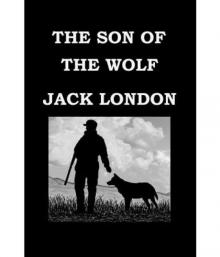 The Son of the Wolf
The Son of the Wolf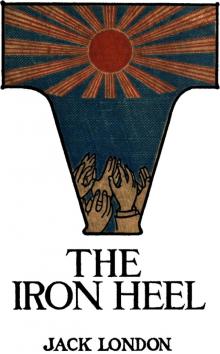 The Iron Heel
The Iron Heel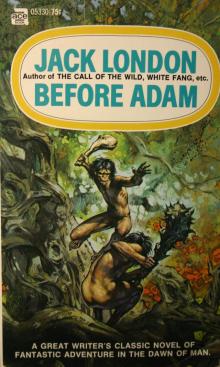 Before Adam
Before Adam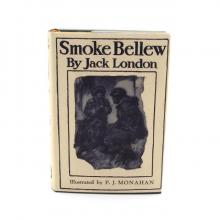 Smoke Bellew
Smoke Bellew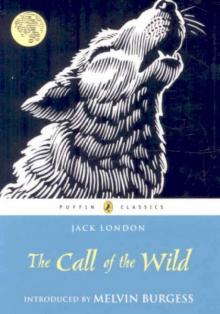 The Call of the Wild
The Call of the Wild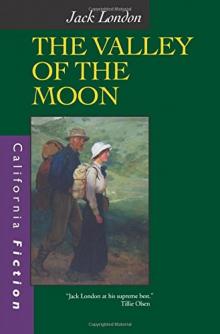 The Valley of the Moon Jack London
The Valley of the Moon Jack London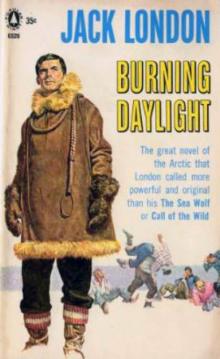 Burning Daylight
Burning Daylight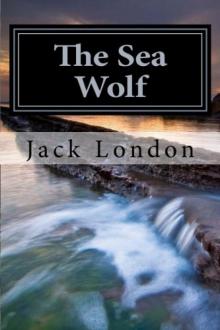 The Sea Wolf
The Sea Wolf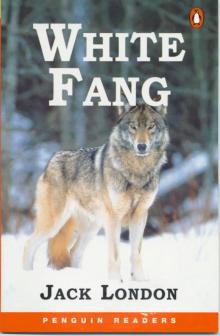 White Fang
White Fang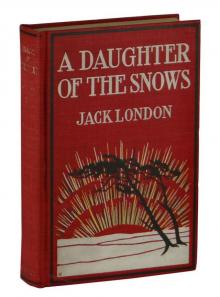 A Daughter of the Snows
A Daughter of the Snows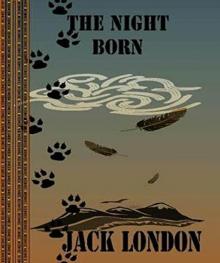 The Night-Born
The Night-Born A Son Of The Sun
A Son Of The Sun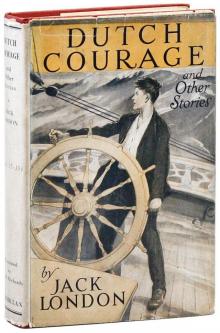 Dutch Courage and Other Stories
Dutch Courage and Other Stories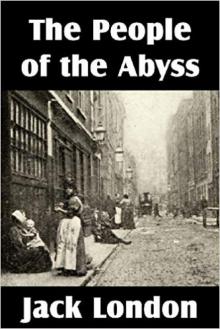 The People of the Abyss
The People of the Abyss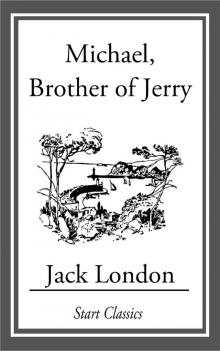 Michael, Brother of Jerry
Michael, Brother of Jerry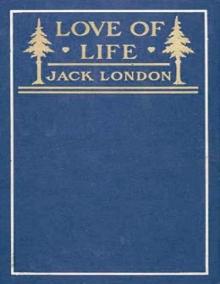 Love of Life, and Other Stories
Love of Life, and Other Stories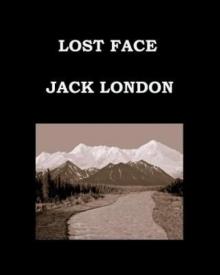 Lost Face
Lost Face The Road
The Road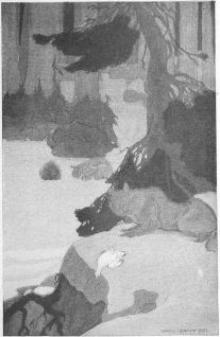 Love of Life
Love of Life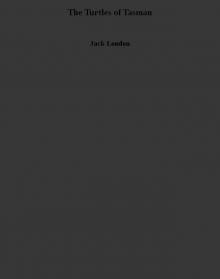 The Turtles of Tasman
The Turtles of Tasman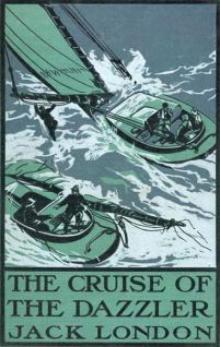 The Cruise of The Dazzler
The Cruise of The Dazzler The Heathen
The Heathen The Scab
The Scab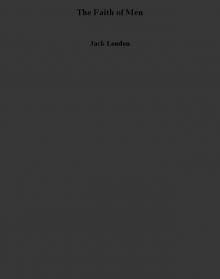 The Faith of Men
The Faith of Men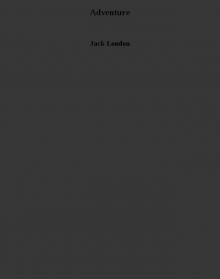 Adventure
Adventure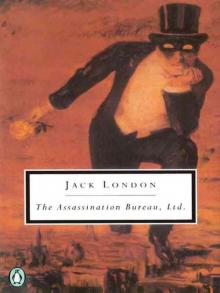 The Assassination Bureau, Ltd.
The Assassination Bureau, Ltd.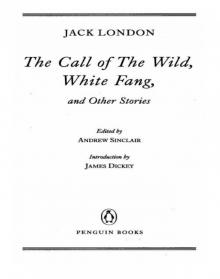 The Call of the Wild, White Fang, and Other Stories
The Call of the Wild, White Fang, and Other Stories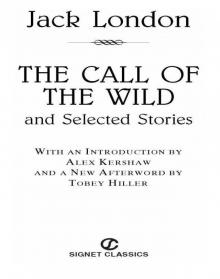 The Call of the Wild and Selected Stories
The Call of the Wild and Selected Stories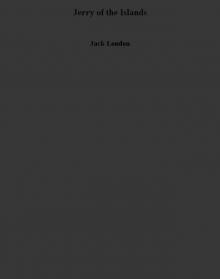 Jerry of the Islands
Jerry of the Islands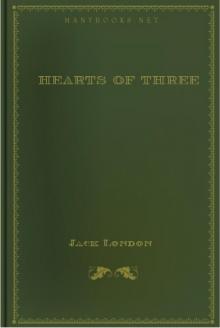 Hearts of Three
Hearts of Three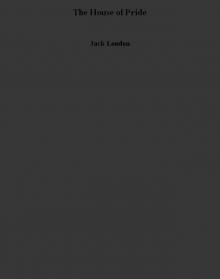 The House of Pride
The House of Pride Moon-Face and Other Stories
Moon-Face and Other Stories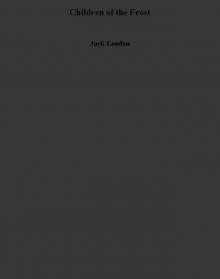 Children of the Frost
Children of the Frost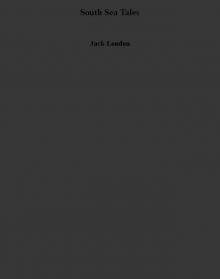 South Sea Tales
South Sea Tales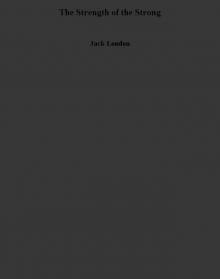 The Strength of the Strong
The Strength of the Strong The Jacket (The Star-Rover)
The Jacket (The Star-Rover)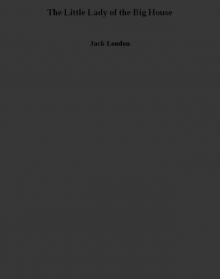 The Little Lady of the Big House
The Little Lady of the Big House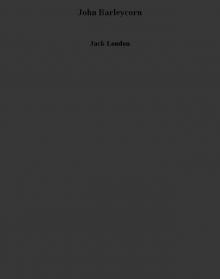 John Barleycorn
John Barleycorn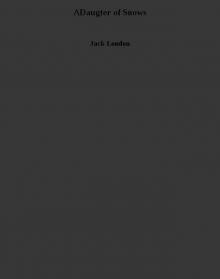 ADaugter of Snows
ADaugter of Snows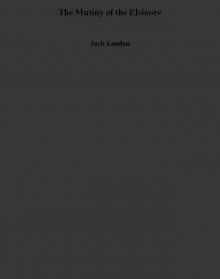 The Mutiny of the Elsinore
The Mutiny of the Elsinore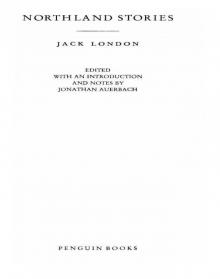 Northland Stories
Northland Stories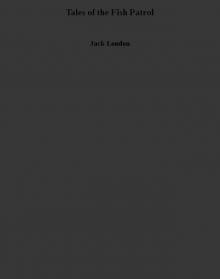 Tales of the Fish Patrol
Tales of the Fish Patrol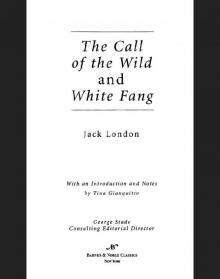 Call of the Wild and White Fang (Barnes & Noble Classics Series)
Call of the Wild and White Fang (Barnes & Noble Classics Series)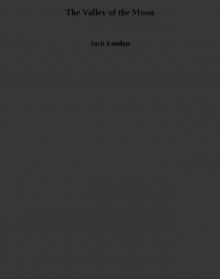 The Valley of the Moon
The Valley of the Moon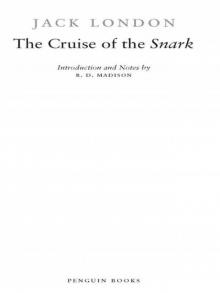 The Cruise of the Snark
The Cruise of the Snark The Game
The Game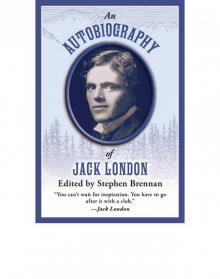 An Autobiography of Jack London
An Autobiography of Jack London